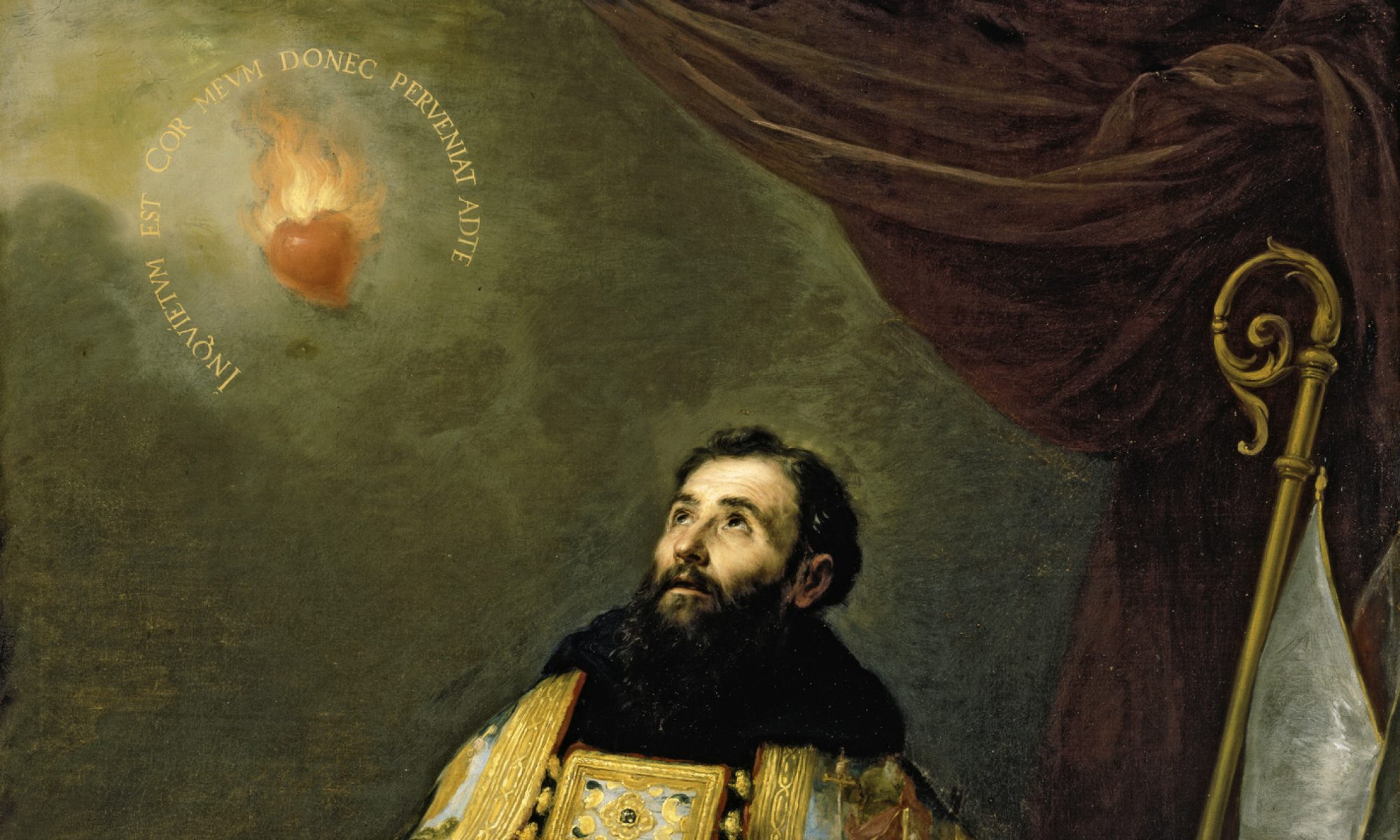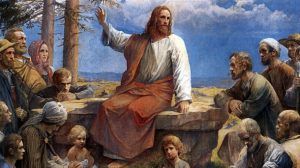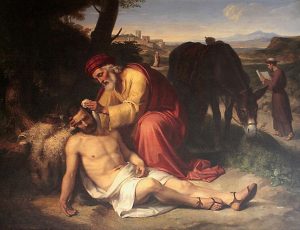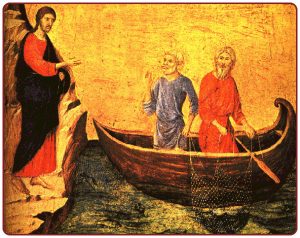Today is the 22nd Sunday in Ordinary Time. I can feel the morning breeze as I travel to the Latin Mass early in the morning. This is a blessing after the hot summer, but sometimes the weather is unpredictable these days.
The first reading taken from the book of the prophet Jeremiah narrates to us that as if he was duped or tricked God. He said, “The word of the Lord has brought me derision and reproach all day.” This is an expression of the inner sentiments of Jeremiah, but he knows that his work is not predicting what will happen like a fortune teller. His main task is to be the “spokesperson” of God. Jeremiah is a prophet who is to inform or remind the people when they don’t do what God wants and when they run the world according to their own plans and not God’s. The prophet’s work is difficult, and sometimes nobody listens. Many times, based on my experience when I write something, many just see it but never try to validate through writing some comments of their own realization and witnessing. I am sure God wouldn’t dupe us.
In the second reading from the letter of St. Paul to the Romans, Paul presents to us that by God’s mercy, “to offer your bodies as living sacrifices, holy and pleasing to God, your spiritual worship” (v.1). Since God is giving us mercy, we should submit ourselves to him. Our bodies are to be given to God in worship as a living and continuous response to Him. We are set apart for Him, to serve Him and to be holy and pleasing to God. We must be faithful and sensible people responding to God by “not conforming to the pattern of this world but be transformed by the renewing of our mind” (v. 2). Our standard of behavior is no longer the society around us but is according to our conscious effort to God’s way. I believe that God’s instructions are not arbitrary rules just to test us but to avoid causing sin inflicting pain on ourselves and others.
The gospel is somewhat of a difficult challenge for Jesus’ disciples and for us. Three things are required:
First, we are asked to offer ourselves as “living sacrifice.” This resonates the words of St. Paul that our “bodies are living sacrifices, holy and pleasing to God,” which basically reminds us that we are created in the image of God and the temple of the Holy Spirit. I guess it isn’t easy to understand this; however, our lives must be different. We need to accept that the world around us offers different challenges, and yet the same demand remains to resist conforming to what is around us, what the secular world calls success, but rather for St. Augustine is seeking the will of God. We often ask what are the great questions in life, and perhaps this gospel offers the definitive question: What profit would there be for one to gain the whole world and forfeit his life?
Second, we heard these words from Jesus, “deny oneself, take up your cross.” This is some advice by the Lord, not in a literal sense, but rather Jesus is asking us to actualize this in a more interior following of Him just as He lived by His showing up as an example to imitate Him interiorly. Jesus interiorly knew Himself to be the one carrying for us our own “Cross,” more than the wood of Calvary, but the flesh and spirit. He is our destiny for our whole life, our Savior, for He is offering us His embrace of the totality of our reality being limited. I may say that some of us are prone to “pain-avoidance,” or we are avoiding the Cross for we are pampered in a culture or society promoting “painless” existence. In many hospitals, they have these classic words, “Comfort Care,” for people who are terminally ill, but I believe it is about silently killing the patient, making the person’s life shorter, by “Euthanasia, or mercy killing!” The Encyclopedia Britannica defines it as “act or practice of painlessly putting to death persons suffering from painful and incurable disease or incapacitating physical disorder or allowing them to die by withholding treatment or withdrawing artificial life-support measures.” Developed countries resort to immoral actions, and many medical workers cannot understand the Christian concept of “redemptive suffering.” Hospitals favor insurance companies to save money rather than to save lives.
Third, Jesus says, “follow me.” Following Jesus means being with him in the pattern of who He is, who is giving a total gift of self for us. Following Him also involves taking up a mission. It is a mission given and carried out with complete surrender. Sometimes what hinders us is our thought of self-preservation and that to follow Jesus is hard. As Catholics, we have the ability to discern well our choices that will preserve our life, thrive to succeed with the happiness and meaning, and avoid unhealthy patterns which put us to defeat and disappointments.
Jesus shows us the way and opens our eyes to see our lives from a transformed viewpoint with eternal life as our central focus and desire. We must be prophets to speak about God to others and to our society. God is waiting for us to conform with Him in all things.
God bless you.
Fr. Arlon, osa
————————————
El Dictado del Corazón: Vigésimo Segundo Domingo del Tiempo Ordinario, año A
- Jeremías 20:7-9
- Salmo 63:2, 3-4, 5-6, 8-9
- Romanos 12:1-2
- Mateo 16:21-27
Hoy es el Vigésimo Segundo Domingo del Tiempo Ordinario, año A. Puedo sentir la brisa de la mañanamientras manejó a la Misa en latín temprano en la mañana. Esto es una bendición después del caluroso verano, pero a veces el clima es impredecible estos días.
La primera lectura tomada del libro del profeta Jeremías nos narra que le dijo a Dios que el Señor lo engañó. Él dijo: “La palabra del Señor me ha traído escarnio y oprobio todo el día”. Esta es una expresión de los sentimientos internos de Jeremías, pero él sabia que su trabajo no es predecir lo que sucederá como un adivino. Su principal tarea es ser el “portavoz” de Dios. Jeremías es un profeta que debe informar al pueblo cuando no hacen lo que Dios manda y cuando dirigen el mundo según sus planes y no los de Dios. La labor del profeta es difícil y, a veces, nadie escucha. Muchas veces, según mi experiencia cuando escribo algo, muchos simplemente lo ven pero nunca intentan validarlo escribiendo algunos comentarios de su realización y testimonio. Estoy seguro de que Dios no nos engañaría.
En la segunda lectura de la carta de San Pablo a los Romanos, Pablo nos presenta que por la misericordia de Dios, “ofrezcan ustedes mismos como una ofrenda viva, santa y agradable a Dios” (v.1). Dado que Dios nos está dando misericordia, debemos someternos a él. Nuestros cuerpos deben ser entregados a Dios en adoración como una respuesta viva y continua a Él. Estamos apartados para Él, para servirle y para ser santos y agradables a Dios. Debemos ser personas fieles y sensatas que respondan a Dios “no conformándonos a las costumbres de este siglo, sino transformandonos por la renovación de nuestra mente” (v. 2). Nuestro estándar de conducta ya no es la sociedad que nos rodea, sino nuestro esfuerzo consciente por seguir el camino de Dios. Creo que las instrucciones de Dios no son reglas arbitrarias sólo para ponernos a prueba, sino para evitar causar pecado e infligir dolor a nosotros mismos y a los demás.
El evangelio es un desafío algo difícil para los discípulos de Jesús y para nosotros. Se requieren tres cosas:
Primero, se nos pide que nos ofrezcamos como “sacrificio vivo”. Esto resuena con las palabras de San Pablo de que nuestros “cuerpos son sacrificios vivos, santos y agradables a Dios”, lo que nos recuerda que somos creados a imagen de Dios y templo del Espíritu Santo. Supongo que no es fácil entender esto; sin embargo, nuestras vidas deben ser diferentes. Necesitamos aceptar que el mundo que nos rodea ofrece diferentes desafíos y, sin embargo, permanece la misma exigencia de resistirnos a conformarnos con lo que nos rodea, lo que el mundo secular llama éxito, sino de buscar la voluntad de Dios. A menudo nos preguntamos cuáles son las grandes preguntas de la vida, y quizás este evangelio ofrezca la pregunta definitiva: ¿De qué le serviría a uno ganar el mundo entero y perder su vida?
En segundo lugar, escuchamos estas palabras de Jesús: “Niégate a ti mismo, toma tu cruz”. Este es un consejo del Señor, no en un sentido literal, sino que Jesús nos pide que lo actualicemos en un seguimiento más interior de Él, así como Él vivió mostrándose como ejemplo para imitarlo interiormente. Jesús interiormente se sabía quien llevaba por nosotros nuestra propia “Cruz”, más que el madero del Calvario, sino la carne y el espíritu. Él es nuestro destino para toda nuestra vida, nuestro Salvador, porque Él nos está ofreciendo su abrazo de la totalidad de nuestra realidad siendo limitada. Puedo decir que algunos de nosotros somos propensos a “evitar el dolor”, o que evitamos la Cruz porque somos mimados en una cultura o sociedad que promueve una existencia “sin dolor”. En muchos hospitales tienen estas palabras clásicas, “cuidados reconfortantes”, para las personas con enfermedades terminales, pero creo que se trata de matar silenciosamente al paciente, acortar la vida de la persona, mediante la “eutanasia o el asesinato por piedad”. La Enciclopedia Británica lo define como el “acto o práctica de dar muerte sin dolor a personas que padecen una enfermedad dolorosa e incurable o un trastorno físico incapacitante o permitirles morir reteniendo el tratamiento o retirando las medidas artificiales de soporte vital”. Los países desarrollados recurren a acciones inmorales y muchos trabajadores médicos no pueden entender el concepto cristiano de “sufrimiento redentor”. Los hospitales prefieren a las compañías de seguros para ahorrar dinero en lugar de salvar vidas.
En tercer lugar, Jesús dice: “Sígueme”. Seguir a Jesús significa estar con él según el modelo de quien es Él, que se entrega totalmente por nosotros. Seguirlo implica también asumir una misión. Es una misión dada y realizada con total entrega. A veces lo que nos obstaculiza es nuestro pensamiento de autoconservación y que seguir a Jesús es difícil. Como católicos, podemos discernir bien nuestras decisiones que preservarán nuestra vida, prosperar para tener éxito con felicidad y significado, y evitar patrones nocivos que nos lleven a la derrota y a la decepción.
Jesús nos muestra el camino y nos abre los ojos para ver nuestra vida. Desde un punto de vista transformado con la vida eterna como nuestro enfoque y deseo central. Debemos ser profetas para hablar de Dios a los demás y a nuestra sociedad. Dios está esperando que lo pongamos en primer lugar en todas las cosas.
Dios los bendiga.
P. Arlón, osa








